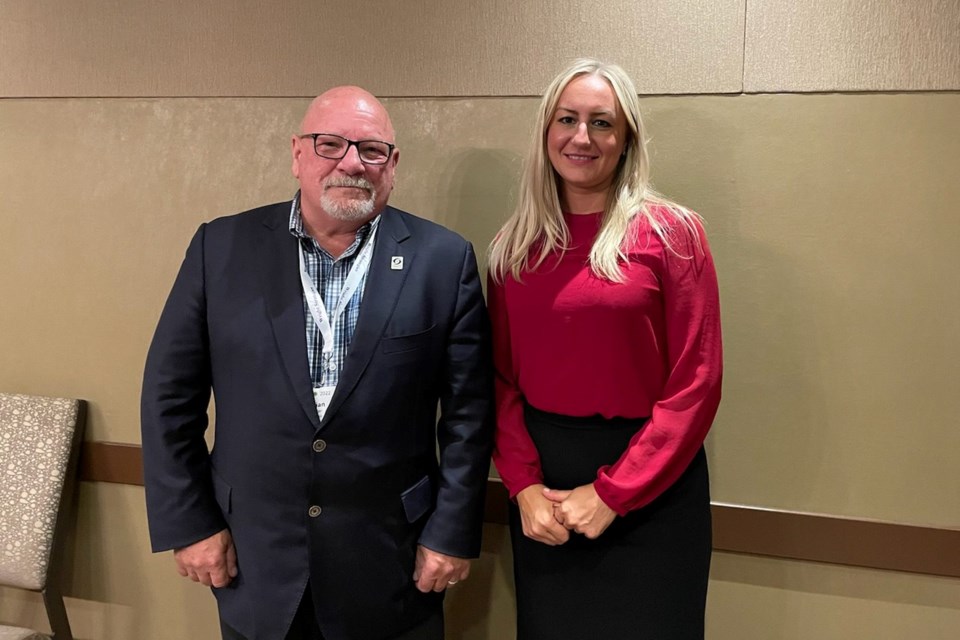Mayor Brian Bigger has a lengthy list of things to advocate for with provincial officials during this week’s Association of Municipalities of Ontario Conference.
Speaking to Sudbury.com by phone from the Ottawa-based meetings at mid-day Monday, Bigger said front and centre in his mind has been affordable housing and the city’s vulnerable population.
Although the city has decided to move forward with both a supervised consumption site and transitional housing complex, they’ve yet to receive provincial funding for operations.
“Now that we have the (federal) exemption … the funding of the supervised consumption site I believe is imminent,” Bigger said, drawing this opinion from a series of meetings with provincial officials, albeit without a guarantee to date.
The transitional housing complex, for which city council approved a $14.4-million design-build tender for last week, remains more of a question mark.
Both facilities require staff members made up of medical professionals, which Bigger has publicly noted to the province since last year should be their funding responsibility.
Nurses are slated to overlook people injecting substances at the downtown supervised consumption site, while 12 full-time and four part-time staff members comprising an Assertive Community Treatment Team are poised to help 40 chronically homeless people transition into permanent community housing through the transitional housing complex on Lorraine Street.
Approximately 12 chronically homeless people are already being assisted by a smaller version of this team, which will ramp up once the complex is up and running by the end of the year, Bigger said.
The mayor has the ear of Mental Health and Addictions Associate Minister Michael Tibollo on these matters this week, whom he also connected with on the subject a couple weeks ago.
With Bigger accompanied by city CAO Ed Archer, city director of communications and community engagement Marie Litalien, and strategic initiatives, communications and citizen services executive director Ian Wood, the local team also has numerous other points to advocate for.
Ontario Community Infrastructure Fund
The province’s annual allotment of infrastructure dollars via the Ontario Community Infrastructure Fund doubled this year, but Greater Sudbury’s share barely grew.
This is due to the province capping the amount awarded to single-tier municipalities such as Greater Sudbury at $10 million, meaning last year’s allotment of $9.3 million is not doubling to the $18.6 million it would have without the cap.
Bigger clarified earlier this year that it’s not just $8.6 million the city is talking about in conversation with the province, but that amount per year “for the foreseeable future,” which he said “really begins to add up to a lot of money.”
Earlier this year, Greater Sudbury joined the Municipality of Chatham-Kent and the City of Thunder Bay in issuing a letter to the province asking they remove the cap.
Bigger met with Infrastructure Minister Kinga Surma this week on this matter, which he described as “positive.”
Valley East Twin Pad, Junction East
The Valley East Twin Pad and Junction East Cultural Hub are two viable projects worthy of provincial funding, Bigger said.
“It fits well with funding that relates to making operations more efficient, therefore less costly to operate,” Bigger said, noting both facilities would replace existing buildings whose aging infrastructure isn’t as environmentally friendly as modern buildings are.
The Junction East Cultural Hub is a $98.5-million project the city is inching toward, whose budget includes $37.2 million from external sources they have yet to secure. The facility would accommodate a new central library downtown alongside space for a new Art Gallery of Sudbury and the Sudbury Multicultural and Folk Arts Association.
The Valley East Twin Pad is a sports complex planned for Hanmer at a cost of $29.2 million, which city council approved funding for during 2022 budget deliberations. This approval, however, is contingent on the city receiving $20 million from senior levels of government they have yet to secure.
Economic development, affordable housing
There’s prime opportunity in Greater Sudbury to serve the burgeoning electric vehicle market through the local mining industry, Bigger said.
“We have a better opportunity of attracting more large-scale operations of businesses and investments to Sudbury,” he told Sudbury.com – a point he’s sharing in Ottawa this week.
The city is currently advocating for the federal government to make the Rural and Northern Immigration Pilot Program permanent, which Bigger said he is also sharing with provincial officials.
“The bottom line in all this advocacy is that affordable housing is so important,” he said. “Your immigration strategy hinges on people being able to find affordable housing.
“We’re doing very well from Sudbury standards, but I see from the direction the province is going … there’s going to be a strong push for more suitable and affordable housing for people across Ontario. … Pretty much everything hinges on housing.”
Tyler Clarke covers city hall and political affairs for Sudbury.com.
